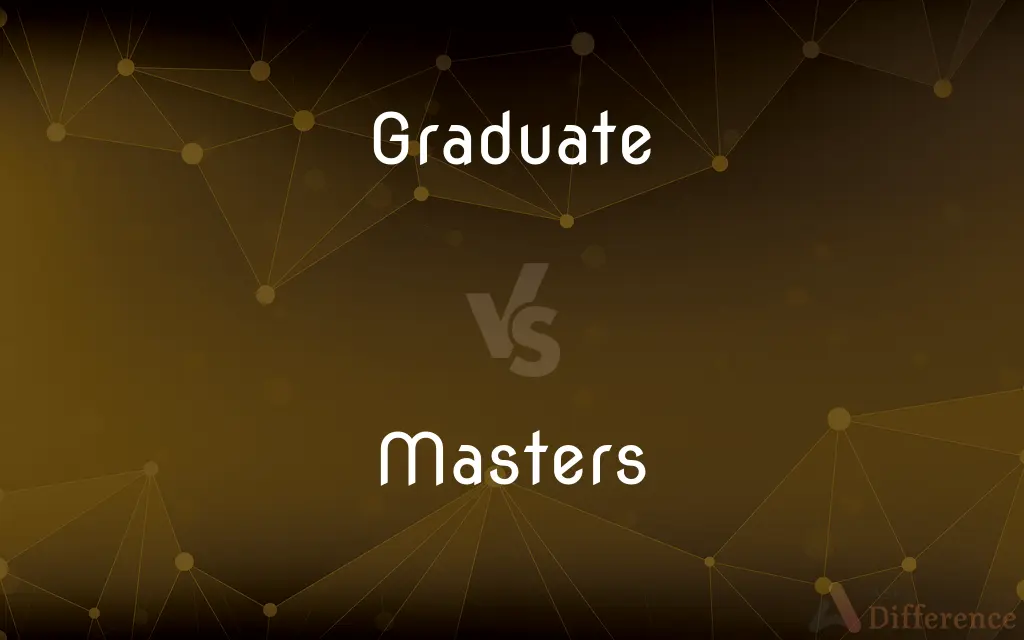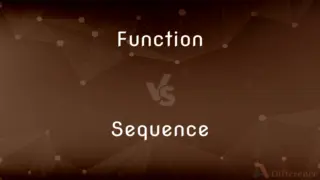Graduate vs. Masters — What's the Difference?
Edited by Tayyaba Rehman — By Fiza Rafique — Updated on September 28, 2023
A "Graduate" is someone who has successfully completed a degree program, while a "Master" refers to an advanced academic degree or a person with high proficiency in a subject.

Difference Between Graduate and Masters
Table of Contents
ADVERTISEMENT
Key Differences
The terms "Graduate" and "Master" are both closely tied to the realm of academia, but they signify different milestones and competencies. A Graduate is an individual who has finished a course of study at an educational institution. This could range from high school to undergraduate programs at universities. Conversely, a Master typically refers to someone who has pursued further studies beyond the basic graduation level, completing an advanced degree.
While every Master is a Graduate, not every Graduate possesses a Master's degree. For instance, an individual might be a Graduate after obtaining their bachelor's degree but would become a Master only after further studies, culminating in a Master's degree like an M.A. or M.S. Beyond academia, the word Master also denotes expertise. A Master craftsman or a Master artist implies high proficiency in their respective fields.
Graduate also suggests the action of completing one's education. Someone who "graduates" has moved from one level to another, marking a transition. However, Master implies mastery, suggesting someone who not only has an advanced degree but also possesses deep knowledge or skill in a particular area.
Comparison Chart
Definition
Completion of a course of study
Advanced academic degree or high proficiency
Implies
Successful end of an academic program
Deep knowledge or expertise in a field
ADVERTISEMENT
Contextual Usage
Educational accomplishment
Both educational and professional expertise
Action/Occurrence
Marks transition from one educational level to another
Achieved after further studies or mastering a skill
Example
Completing a bachelor's degree
Earning a Master's degree or mastering an art form
Compare with Definitions
Graduate
A person who has completed an academic degree.
She is a Graduate of Harvard University.
Masters
A person highly skilled in a particular area.
She is a Master pianist.
Graduate
The act of completing educational requirements.
She will Graduate next spring.
Masters
Someone possessing a higher-level academic degree.
He is a Master in Business Administration.
Graduate
To move from one level to another in academia.
He will Graduate to the next grade after this year.
Masters
Dominant or principal individual/thing.
The lion is the Master of the jungle.
Graduate
Transition from student to degree holder.
As a new Graduate, she's exploring job opportunities.
Masters
To become highly proficient in a skill or subject.
He mastered the art of public speaking.
Graduate
A person who has successfully completed a course of study or training, especially a person who has been awarded an undergraduate or first academic degree.
Masters
An original version from which copies are made.
This painting is the Master copy.
Graduate
A graduated cup, tube, flask, or measuring glass, used especially by chemists and pharmacists.
Masters
Plural of master
Graduate
Successfully complete an academic degree, course of training, or (in North America) high school
He graduated from Glasgow University in 1990
He graduated in the summer with a 2:2 degree
Masters
A master's degree.
Graduate
Arrange in a series or according to a scale
The stones were graduated in height from the lowest near the entrance to the tallest opposite
Masters
United States poet (1869-1950)
Graduate
Change (something, typically colour or shade) gradually or step by step
The colour is graduated from the middle of the frame to the top
Graduate
To be granted an academic degree or diploma
Most of the entering freshmen stayed to graduate.
Graduate
To change gradually or by degrees
"The most weighty of all the arguments against treating the races of man as distinct species, is that they graduate into each other" (Charles Darwin).
Graduate
To advance to a new level of skill, achievement, or activity
After a month of diving instruction, they all graduated to back flips.
Graduate
To grant an academic degree or diploma to
The school has graduated many gifted chemists.
Graduate
Usage Problem To receive an academic degree from
How many chemists graduated the Institute last year?.
Graduate
To arrange or divide into categories, steps, or grades
Graduate an income tax.
Graduate
To divide into marked intervals, especially for use in measurement
Graduate a thermometer.
Graduate
One who has received an academic degree or diploma.
Graduate
A graduated container, such as a cylinder or beaker.
Graduate
Possessing an academic degree or diploma.
Graduate
Of, intended for, or relating to studies beyond a bachelor's degree
Graduate courses.
Graduate
A person who is recognized by a university as having completed the requirements of a degree studied at the institution.
If the government wants graduates to stay in the country they should offer more incentives.
Graduate
A person who is recognized by a high school as having completed the requirements of a course of study at the school.
Graduate
(Philippines) A person who is recognized as having completed any level of education.
Graduate
A graduated (marked) cup or other container, thus fit for measuring.
Graduate
Graduated, arranged by degrees
Graduate
Holding an academic degree
Graduate
Relating to an academic degree
Graduate
To be recognized by a school or university as having completed the requirements of a degree studied at the institution.
The man graduated in 1967.
Trisha graduated from college.
Graduate
To be certified as having earned a degree from; to graduate from (an institution).
Trisha graduated college.
Graduate
(transitive) To certify (a student) as having earned a degree
Indiana University graduated the student.
The college graduated him as soon as he was no longer eligible to play under NCAA rules.
Graduate
(transitive) To mark (something) with degrees; to divide into regular steps or intervals, as the scale of a thermometer, a scheme of punishment or rewards, etc.
Graduate
(intransitive) To change gradually.
Sandstone which graduates into gneiss; carnelian sometimes graduates into quartz
Graduate
To prepare gradually; to arrange, temper, or modify by degrees or to a certain degree; to determine the degrees of.
To graduate the heat of an oven
Graduate
(chemistry) To bring to a certain degree of consistency, by evaporation, as a fluid.
Graduate
To taper, as the tail of certain birds.
Graduate
(Japanese entertainment) Of an idol: to exit a group; or of a virtual YouTuber, to leave a management agency; usually accompanied with "graduation ceremony" send-offs, increased focus on the leaving member, and the like.
Graduate
To mark with degrees; to divide into regular steps, grades, or intervals, as the scale of a thermometer, a scheme of punishment or rewards, etc.
Graduate
To admit or elevate to a certain grade or degree; esp., in a college or university, to admit, at the close of the course, to an honorable standing defined by a diploma; as, he was graduated at Yale College.
Graduate
To prepare gradually; to arrange, temper, or modify by degrees or to a certain degree; to determine the degrees of; as, to graduate the heat of an oven.
Dyers advance and graduate their colors with salts.
Graduate
To bring to a certain degree of consistency, by evaporation, as a fluid.
Graduate
To pass by degrees; to change gradually; to shade off; as, sandstone which graduates into gneiss; carnelian sometimes graduates into quartz.
Graduate
To taper, as the tail of certain birds.
Graduate
To take a degree in a college or university; to become a graduate; to receive a diploma.
He graduated at Oxford.
He was brought to their bar and asked where he had graduated.
Graduate
One who has received an academical or professional degree; one who has completed the prescribed course of study in any school or institution of learning.
Graduate
A graduated cup, tube, flask, or cylinder; a glass measuring container used by apothecaries and chemists. See under Graduated.
Graduate
Arranged by successive steps or degrees; graduated.
Beginning with the genus, passing through all the graduateand subordinate stages.
Graduate
A person who has received a degree from a school (high school or college or university)
Graduate
A measuring instrument for measuring fluid volume; a glass container (cup or cylinder or flask) whose sides are marked with or divided into amounts
Graduate
Receive an academic degree upon completion of one's studies;
She graduated in 1990
Graduate
Confer an academic degree upon;
This school graduates 2,000 students each year
Graduate
Make fine adjustments or divide into marked intervals for optimal measuring;
Calibrate an instrument
Graduate a cylinder
Graduate
Of or relating to studies beyond a bachelor's degree;
Graduate courses
Graduate
Someone who has successfully finished a course of study.
After four years, he became a Graduate.
Common Curiosities
What does a Master's degree indicate?
A Master's degree indicates advanced study and deep knowledge in a particular field.
Can the term 'Master' be used outside of academia?
Yes, "Master" can denote high proficiency or dominance in any field.
Is a Graduate degree the same as a Master's degree?
No, a Graduate degree is a general term for post-baccalaureate programs, which includes Master's and doctoral degrees.
What comes after a Master's degree in academia?
Typically, a doctoral degree (like a Ph.D.) follows a Master's degree.
Do all Graduate programs lead to a Master's degree?
No, Graduate programs can lead to various degrees, including Master's, doctoral, and professional degrees.
Is someone with a bachelor's degree considered a Master?
No, a bachelor's degree holder is a Graduate but not a Master in academic terms.
Is every Master also a Graduate?
Yes, every Master is a Graduate, but not every Graduate is a Master.
Can 'Graduate' also be a verb?
Yes, "to Graduate" means to complete one's studies successfully.
Which term denotes completion of high school: Graduate or Master?
Graduate. One is a high school Graduate upon completion.
Does a Master always indicate higher education?
No, while often referring to higher education, it can also denote expertise or dominance.
Does "mastering a skill" mean acquiring a Master's degree in it?
No, "mastering a skill" means becoming highly proficient in it, not necessarily earning a degree.
What's the verb form of Master?
The verb form is "to master," meaning to become highly skilled in.
Which word is broader in scope, Graduate or Master?
Graduate is broader, referring to anyone who completes a course of study.
Share Your Discovery

Previous Comparison
Persued vs. Fled
Next Comparison
Function vs. SequenceAuthor Spotlight
Written by
Fiza RafiqueFiza Rafique is a skilled content writer at AskDifference.com, where she meticulously refines and enhances written pieces. Drawing from her vast editorial expertise, Fiza ensures clarity, accuracy, and precision in every article. Passionate about language, she continually seeks to elevate the quality of content for readers worldwide.
Edited by
Tayyaba RehmanTayyaba Rehman is a distinguished writer, currently serving as a primary contributor to askdifference.com. As a researcher in semantics and etymology, Tayyaba's passion for the complexity of languages and their distinctions has found a perfect home on the platform. Tayyaba delves into the intricacies of language, distinguishing between commonly confused words and phrases, thereby providing clarity for readers worldwide.















































